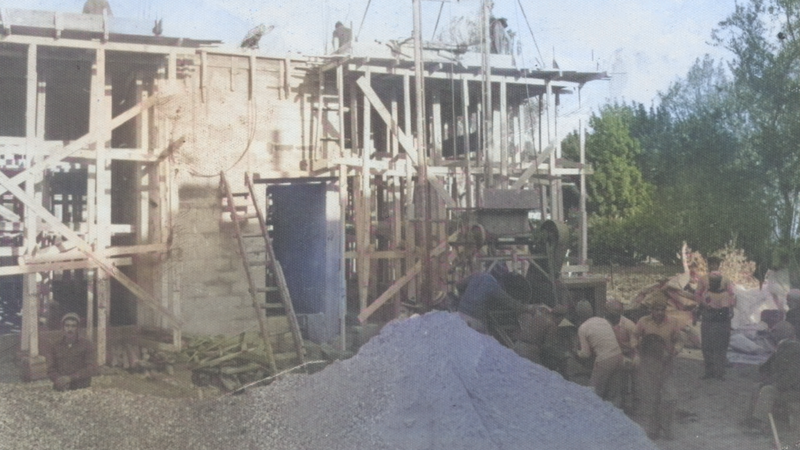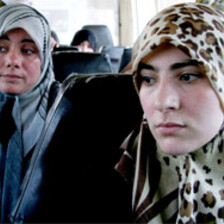The Electronic Intifada 15 September 2025

The author’s grandfather took this photo in the 1960s, when the family’s home was under construction led by Abu Shawqi.
Some stories come from books, but the ones that shape you often come from the people sitting right in front of you. These stories carry with them years that you never lived but that you’ve somehow inherited.
For me, those stories came through Abu Shawqi.
Abu Shawqi was Ziad Sbaih, my father’s uncle and the grandfather of my best friend Mahmoud.
He was born in Gaza in 1947, a year before the Nakba – the 1948 expulsion of the Palestinian people from most of Palestine by Zionist militias – in a world so different from mine yet tied to it by blood and geography.
As a kid, I would go to Abu Shawqi’s house in Gaza City, on al-Sahaba street in al-Daraj neighborhood, almost every morning to wait for Mahmoud so we could walk to school together.
Abu Shawqi’s mini-market sat just outside their front door, its shelves lined with cookies, tea and canned goods.
He opened it early, long before the streets filled with the day’s noise. I would sit with him until Mahmoud came down.
One day I asked him, out of curiosity, how he managed to own such a huge building just by running a mini-market.
He looked at me with a half-smile and said, “I used to be a contractor. I worked for 30 years. I even built the house you live in, and all of our family’s houses in this neighborhood, including what you think is my huge building.”
I remember sitting there, stunned.
Was it possible that our grandparents had entire lives before we were even born, stories and achievements we never imagined? In that moment, I saw him in a completely different light, not just as the man who handed me pastries – what in Gaza we call cakes – in the morning, but as someone who had built so much of the world around me.
Mahmoud came down the stairs and the morning moved forward again. I stood up and put the bag over my shoulder.
Before I left, Abu Shawqi pressed the cake into my hand.
At school, the idea stayed with me. This man behind the counter of cookies and tea was the same man who had built the walls around me, the ceiling I slept under.
Abu Shawqi the storyteller
From then on, sitting with Abu Shawqi was less about passing the time and more about listening, as though each story contained a bit of information, a clue, that connected me to a life I had never known.
Those mornings at the mini-market transported me to another Gaza; one I had never lived in but that began to materialize through his words.
He often spoke with longing of his childhood on al-Sahaba street in the 1950s.
He would close his eyes and remember his mother’s cooking and the way the family would gather in a circle on the ground to eat together. What he missed most was the fresh, golden bread baked in their clay oven, its warmth and aroma filling the house.
His mother was a housewife, while his father worked as a builder. Abu Shawqi had two older siblings, including my grandfather, Abu Adel, and five younger siblings.
He would speak of my grandfather, who passed away two years before the war, with a mixture of sorrow and fondness.
During this genocidal war, even when he closed the shop, every now and then my extended family would gather in the afternoon at his sun-warmed doorstep to have a chat with him and listen to his stories.
He would ask his grandchildren to bring chairs and arrange them in a circle and for his wife to prepare tea for the guests. He would sit in the middle, with his wooden cane in his lap and a glass of hot tea in his hand, waiting for all the family to come and sit around him.
Then he would tell us his stories.
Our second skin
Abu Shawqi usually began talking when someone asked a simple question about the old neighborhood, a certain building or a face in a photograph. His answers were never short.
He didn’t prepare his stories or mark them with a dramatic start; they slipped naturally into conversation.
What we were living through, he said, the massacres, the hunger, the endless mass displacement, isn’t new – only sharper, crueler. He said that Palestinians were born into hardship, carrying it like a second skin: occupation, siege, exile without leaving home.
He described his childhood in Gaza after the Nakba as a life lived in exile on his own soil, a strange existence where you inherit the land of your ancestors yet are treated as though you are a trespasser. Stability was something he never had the chance to experience, as it was stolen from him long before he even knew what it meant.
The Naksa, or setback, in 1967 marked another turning point in Abu Shawqi’s life, a moment when the familiar streets of Gaza were reshaped by war, displacement and the heavy presence of occupation.
“We lived in a constant state of alert,” Abu Shawqi said. “The soldiers patrolled the streets, their presence a daily reminder that we were not in control of our own land.”
Curfews confined families to their homes, and arbitrary arrests instilled fear in the community.
Yet Abu Shawqi described clandestine meetings where neighbors would gather to discuss ways to resist, to maintain their dignity and to preserve their culture.
“The men who loved their land”
The Naksa and the years that followed were the most difficult of Abu Shawqi’s life.
Abu Shawqi was part of the resistance or, as he put it, “the men who loved their land.” They asked “only to keep their dignity and the bare rights of a human being.”
One day in 1972, after years of relentless oppression at the hands of the Israeli army, he and his comrades decided to stand face to face with the occupation.
In the chaos of that day, a bullet tore into his shoulder. He managed to retreat to his home, where the smell of dust and blood filled the air.
His father, with nothing but a kitchen knife, dug the bullet out. There were no painkillers, only a rag between his teeth and his wife gripping his hands.
Just as Abu Shawqi was showing us the bullet scar on his shoulder, the low, unending hum of drones above us pulled his attention away from the story.
His hearing was not the best at the age of 78, and the sound of drones made it even harder for him to hear. We would speak loudly so he could hear us.
“The sky’s endless buzzing has stolen the music of our neighborhood,” he said with sorrow.
Abu Shawqi then explained that after that day, his family begged him to stop fighting, to bear the humiliation if it meant staying alive, claiming that he wasn’t the only man in Gaza, that somebody else would continue the resistance.
Abu Shawqi told them that living without dignity, humiliated in his own land, was no different than dying. For him, the fight was never his alone, it was the cause of all Palestinians.
As this most recent war dragged on and as our hunger deepened, his voice faded. Famine spares no one, not even the elderly, whose bodies require nourishment and whose presence holds entire communities together.
He stopped telling stories about a year into the genocide, pausing not to collect his thoughts, but to catch his breath. His hands, once steady around his cane, began to tremble.
One afternoon, he didn’t come outside at all.
He wasn’t sick, not in the way we understood sickness.
He was starving. Not just for food, but also for medications.
We couldn’t even procure something as basic as vitamins to strengthen his body and will.
After weeks of lying in bed, weakened by time and illness, Abu Shawqi passed away on 2 July 2025 at age 78.
His absence is not just a loss of a relative or neighbor, it is the disappearance of a living archive, a keeper of the stories that bind us to Gaza.
Ahmad Sbaih is a writer based in Gaza.




